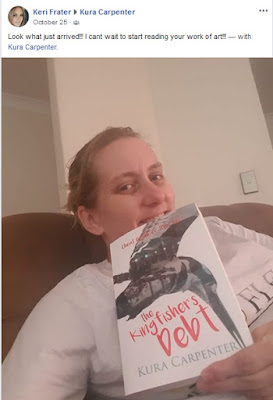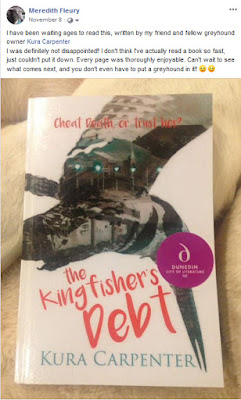What is NaNoWriMo? NaNoWriMo stands for National Novel Writing
Month.
Essentially it’s a global writing event held annually
in November, where participants try to write a 50,000 word novel. 
The first step in participating in
NaNoWriMo is to join via the NaNoWriMo Website.
Then add your local region and find out
who your local ML (Municipal Liaison) is.
According to the website:
Quote - “Municipal Liaisons (MLs) are
volunteers who add a vibrant, real-world aspect to NaNoWriMo
festivities all over the world.
They host regular writing events in November—and some MLs host
write-ins, parties, and workshops all year long. They also oversee
their regional forums and act as official NaNo representatives.”
I first heard about NaNoWriMo a few years ago and this year I’m
participating. As a NaNoWriMo Newbie, today I’m talking to a few
local experts to pick their brains about what to expect when
attending NaNoWriMo for the first time.
Let me introduce my experts:
Talia Nyx - has participated
3
times, the first in 2012.
Talia
is the ML (Municipal
Liaison)
for Otago/Southland.
Judy Mohr – 2016 will
be Judy’s
third official NaNoWriMo, and
her second year as ML for the Christchurch, New Zealand region, along
with Amy Paulussen.
Chris Yee –
first NaNo was in 2011. Chris
is one
of several internationally based online administrators that oversee
and maintain a NaNoWriMo Participants group on Facebook
From
Christchurch, this year
Chris
will
be hanging out with writers in the Twin Cities, Minnesota.
I asked my experts: What is your
role in NaNoWriMo?
Talia:
It is my job to get the region going, and organise Write-ins and
other meet ups, provide motivation, and support; and obviously,
liaise with NaNo HQ.
Judy:
It’s part of our job to coordinate and organise write-ins and other
activities for the region.
Chris: keep
the peace as best as possible, enforcing rules and ensuring that the
group is a safe and friendly place for writers to celebrate (or
lament) the literary profession among like minded individuals.
One of the great things about NaNoWriMo is there are both online
and in-person Write-ins.
I asked my experts, What can newbies expect when
going to their first Write-in /meet-up?
Judy: It will depend entirely on the group and their dynamics. Some
groups will just want to talk, having a good old chin-wag over a cup
of coffee, while others will read out their work and want feedback.
Every group is different, catering to a different set of needs. No
one group is the same.
If it's a scheduled NaNoWriMo
write-in, you can guarantee that there will be writing and little
talking.
Chris:
A warm welcome, inquiry into
your current writing foray and general merriment. A brief
interrogation, but that's just us being interested in what you're
writing about. During NaNoWriMo, the MLs running the meetups will
keep people from being distracted from their writing. They are fairly
relaxed atmospheres and there is no obligation to go for the long
haul, but incentives for being able to reach certain word goals. They
are set up for people who want a place to write and/or talk about
writing.
What To Expect at Write-ins:
Some
groups will just want to talk
a good old chin-wag
A warm welcome
What are the benefits of attending Write-ins?
Talia: I would have to say the
bouncing of ideas. We talk about what we want our story to do, how we
are going about it, we discuss our characters. And we take
inspiration from what and how the others are writing their stories,
but also we can ask them for help clearing a writers block. We share
our ideas freely, and sometimes it is the people themselves who
provide the inspiration. Of course it is always nice to be able to
talk about the madness that we are participating in with people who
understand.
Judy: For
one, it’s where you can meet other writers who understand the
trials and tribulations that you are facing. They’re either going
through it too, or have been there at some point in the past. They
will help you through. Depending on the group dynamics, you can talk
out your stories, bouncing ideas around the table. Sometimes, to make
sense of something yourself, you need a sounding board. Even body
language responses to an idea can be valuable feedback. Those that
write 100% in isolation are missing out on these wonderful resources.
Benefits of attending NaNoWriMo Write-ins :
Bouncing of ideas
Meeting other writers
Other than the offical website, what On-line gatherings are there?
Judy: This year, Amy and I have
joined with MLs from Queensland, Australia and Fayetteville, North
Carolina, USA for a special chat room that we can all use. The chat
room will be open to all, regardless where you are in the world, with
the MLs from the three regions being the moderators and occasionally
running virtual write-ins. The chat room uses new technology and will
be hosted by Jessie Sanders on her website www.jessiescoffeeshop.com.
Full details about the chat room will be made public come
mid-October.
What tips can you share that will improve first timers’
experiences whether joining in on-line or in person.
Talia: Don't give up! There will be at least a few times where you
think that you've lost your mind, you haven't - but you should
probably go to your nearest write-in, they have all been there and
understand what it's like, and they may even be able to help you.
Don't Edit as you write - NaNoWriMo is the production of a first
draft, don't edit, don't delete; make notes in the column if you
wrote something and really hate it, but leave it there ALL THE WORDS
COUNT, and remember it's just a first draft.
Judy: The
biggest advice I can give to any first timers is to introduce
yourself. Make sure people know you’re there. You don’t need to
delve into your life story –– share only what you feel
comfortable sharing –– but if the others don’t know you’re
there, they want interact with you. I know it can be scary, but do
it. Move out of your comfort zone. These are fellow writers. They are
on the same path as you, just maybe at different points. They’ll
understand. They’ll help you through.
Chris: Be
yourself. Whether you're a dabbler or a seasoned pro, it's important
to be comfortable. If you are a complete introvert then it may not be
your cup of tea, but I'm an introvert myself and you can find me
engaging in a topical discussion to retreating into my own crafted
worlds on the screen, typing furiously. We don't judge. Online
instances may be easier to ignore or harder to ignore depending on
who you are, so while I will find I may end up writing instead of
talking online (typing elsewhere won't exactly contribute effectively
to wordcount), but more often than not I would be looking for a
little distraction, which ends up being a bigger distraction, until
you find yourself at 3am having started from a funny cat video to
astrophysics papers on trinary star systems with the occasional
planetary body stuck in a tidally locked orbit.
NaNoWriMo Pro Tips:
Don't give Up
Introduce Yourself
Be Yourself
What can people do the rest of the year?
Talia: The rest of the year, is for rewriting, editing, and planning.
And of course publishing, for those who go that route. But for those
who want to write more on their novels, or have other projects, there
is Camp NaNoWriMo in both April and July; and you set your own word
count goal.
Judy: NaNoWriMo
is about development a habit for writing. There is no reason why that
should stop. If you want to participate in other events like it,
there are two CampNaNos a year (April and July). There are also
Facebook groups that run similar events. Take part in the Twitter
hashtag #NaNoWriMo. The possibilities are endless. Even if you have
no desire to participate in another NaNo-type event, you should still
write.
Chris: Keep
writing of course! Like I said, December is usually reserved for
editing if you want to make something of the story you create,
getting it ready to a publishable state. Others just start up new
projects, or prepare for the next year's NaNoWriMo events including
Camp NaNoWriMo events that occur in both April and July, SoCNoC
(Southern Cross Novel Challenge) which is NaNoWriMo but put on for
June to be more in line with the southern hemisphere's yearly
downtime. There are also various competitions, anthologies and other
various calls for submission happening throughout the year, so there
is no shortage of writing motivators. Otherwise we can go back to
being normal human beings for the 11 months until the craziness
happens again.
What do you wish you knew when you first started attending?
Talia: I
would have to say, that I wish I knew that write-ins are the best. It
sounds ridiculous, but I wish I knew how amazing the write-ins are.
How great the people who attend them are.
Chris: Perhaps
a little more information about where the meetups were happening.
That said, I had only discovered its existence in Christchurch while
I was working fulltime, so the first year I barely had time to find
out where gatherings were happening, much less get any writing done.
Since then with a little more flexibility and scheduling out blocks
of time, to having more of an active role in the community, it's been
a lot of fun meeting the new writers and helping them on their way to
finishing their stories in any way possible.
NaNoWriMo TOP Tips:
Write-ins are the Best
Great People
Thanks everyone, it was great to hear what you had to say. I’m
really looking forward to being part of my first NaNoWriMo.
This article wouldn't have been possible without the generous help of my experts:
 |
| Talia Nyx |
Living in Otago, New Zealand surrounded by students is where Talia Nyx most enjoys writing. She has three currently published works, and is constantly experimenting with style and genre. Talia also loves reading, and will read almost anything once.
Feel free to check out Talia on Wordpress, where she will keep you up to date with the writing she has on her plate, and what she is planning to write during the approaching November for NaNoWriMo. Her other social media is @TaliaNyxAuthor Twitter and Facebook.
 |
| Judy L Mohr |
Kiwi Judy L Mohr is a writer of
fantasy and science fiction. She is also a freelance editor with
Black Wolf Editorial Services (http://blackwolfeditorial.com),
working on projects from writers around the world. When she isn't
writing, editing or doing something for writing within the local
community, she is hosting her own radio show about science on KLRN
Radio (http://klrnradio.com/shows/conversations-in-science/).
You can find out more about Judy's various projects on her personalwebsite
or follow her on twitter @JudyLMohr.
 |
| Chris Yee |
|
Chris Yee is a long-time member of the Christchurch Writers' Guild and a teacher in Film, Video and Animation. In 2015 he approached to teach Stop Motion movies using Lego for the Imagination Station based in Christchurch.
He's recently moved to Minneapolis, Minnesota.























